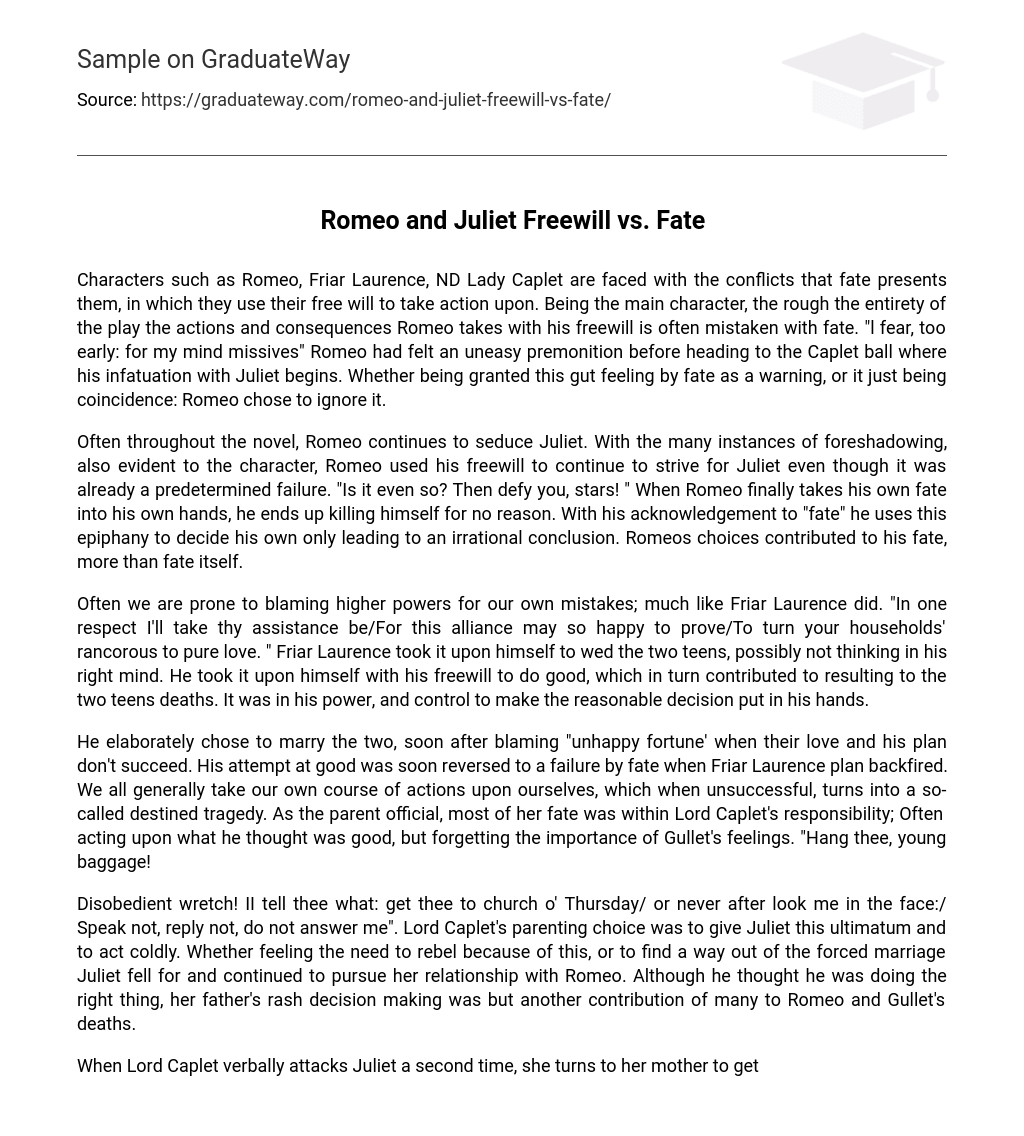Characters such as Romeo, Friar Laurence, ND Lady Caplet are faced with the conflicts that fate presents them, in which they use their free will to take action upon. Being the main character, the rough the entirety of the play the actions and consequences Romeo takes with his freewill is often mistaken with fate. “l fear, too early: for my mind missives” Romeo had felt an uneasy premonition before heading to the Caplet ball where his infatuation with Juliet begins. Whether being granted this gut feeling by fate as a warning, or it just being coincidence: Romeo chose to ignore it.
Often throughout the novel, Romeo continues to seduce Juliet. With the many instances of foreshadowing, also evident to the character, Romeo used his freewill to continue to strive for Juliet even though it was already a predetermined failure. “Is it even so? Then defy you, stars! ” When Romeo finally takes his own fate into his own hands, he ends up killing himself for no reason. With his acknowledgement to “fate” he uses this epiphany to decide his own only leading to an irrational conclusion. Romeos choices contributed to his fate, more than fate itself.
Often we are prone to blaming higher powers for our own mistakes; much like Friar Laurence did. “In one respect I’ll take thy assistance be/For this alliance may so happy to prove/To turn your households’ rancorous to pure love. ” Friar Laurence took it upon himself to wed the two teens, possibly not thinking in his right mind. He took it upon himself with his freewill to do good, which in turn contributed to resulting to the two teens deaths. It was in his power, and control to make the reasonable decision put in his hands.
He elaborately chose to marry the two, soon after blaming “unhappy fortune’ when their love and his plan don’t succeed. His attempt at good was soon reversed to a failure by fate when Friar Laurence plan backfired. We all generally take our own course of actions upon ourselves, which when unsuccessful, turns into a so-called destined tragedy. As the parent official, most of her fate was within Lord Caplet’s responsibility; Often acting upon what he thought was good, but forgetting the importance of Gullet’s feelings. “Hang thee, young baggage!
Disobedient wretch! II tell thee what: get thee to church o’ Thursday/ or never after look me in the face:/ Speak not, reply not, do not answer me”. Lord Caplet’s parenting choice was to give Juliet this ultimatum and to act coldly. Whether feeling the need to rebel because of this, or to find a way out of the forced marriage Juliet fell for and continued to pursue her relationship with Romeo. Although he thought he was doing the right thing, her father’s rash decision making was but another contribution of many to Romeo and Gullet’s deaths.
When Lord Caplet verbally attacks Juliet a second time, she turns to her mother to get out of her arranged marriage whom only responds with the same reaction having to obey her spouse’s wishes. “Talk not to me, for I’ll not say a word/ Do as thou wilt, for I have done with thee. ” Often, people make decisions that can greatly affect ones feelings without us even knowing. Although not sounding extreme with these feelings people can react badly causing a domino effect by freewill.





